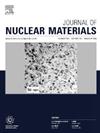Recrystallization of amorphous AlNbCr coatings irradiated with chromium ions
IF 2.8
2区 工程技术
Q3 MATERIALS SCIENCE, MULTIDISCIPLINARY
引用次数: 0
Abstract
Applying an AlNbCr layer on the surface of Zr alloys significantly enhances the alloy resistance to oxidation and high-temperature corrosion. However, the effects of irradiation on AlNbCr coating remain largely unexplored. This work investigates the microstructural evolution of Cr ion-irradiated AlNbCr coatings under varying temperatures, utilizing bright-field transmission electron microscopy (TEM) observations and electron diffraction pattern analyses. With increasing Cr ion irradiation dose, the coatings gradually transitioned from an initial amorphous to a crystalline state. The onset of crystallization occurred earlier at higher temperatures, indicating that the crystallization process was significantly influenced by temperature. Moreover, the dynamic crystallization process of the crystalline structure was also analyzed, as well as the different irradiation responses at the Near-Interface Area (NIA) and Far-Interface Area (FIA). These findings provide new insights for understanding and optimizing the performance of AlNbCr coatings in high-irradiation environments.
铬离子辐照下无定形 AlNbCr 涂层的再结晶
在 Zr 合金表面涂覆 AlNbCr 层可显著增强合金的抗氧化性和耐高温腐蚀性。然而,辐照对 AlNbCr 涂层的影响在很大程度上仍未得到研究。本研究利用明视场透射电子显微镜(TEM)观察和电子衍射图案分析,研究了不同温度下铬离子辐照 AlNbCr 涂层的微观结构演变。随着铬离子辐照剂量的增加,涂层从最初的无定形状态逐渐过渡到结晶状态。温度越高,开始结晶的时间越早,这表明结晶过程受温度的影响很大。此外,还分析了结晶结构的动态结晶过程,以及近界面区(NIA)和远界面区(FIA)的不同辐照响应。这些发现为理解和优化 AlNbCr 涂层在高辐照环境下的性能提供了新的见解。
本文章由计算机程序翻译,如有差异,请以英文原文为准。
求助全文
约1分钟内获得全文
求助全文
来源期刊

Journal of Nuclear Materials
工程技术-材料科学:综合
CiteScore
5.70
自引率
25.80%
发文量
601
审稿时长
63 days
期刊介绍:
The Journal of Nuclear Materials publishes high quality papers in materials research for nuclear applications, primarily fission reactors, fusion reactors, and similar environments including radiation areas of charged particle accelerators. Both original research and critical review papers covering experimental, theoretical, and computational aspects of either fundamental or applied nature are welcome.
The breadth of the field is such that a wide range of processes and properties in the field of materials science and engineering is of interest to the readership, spanning atom-scale processes, microstructures, thermodynamics, mechanical properties, physical properties, and corrosion, for example.
Topics covered by JNM
Fission reactor materials, including fuels, cladding, core structures, pressure vessels, coolant interactions with materials, moderator and control components, fission product behavior.
Materials aspects of the entire fuel cycle.
Materials aspects of the actinides and their compounds.
Performance of nuclear waste materials; materials aspects of the immobilization of wastes.
Fusion reactor materials, including first walls, blankets, insulators and magnets.
Neutron and charged particle radiation effects in materials, including defects, transmutations, microstructures, phase changes and macroscopic properties.
Interaction of plasmas, ion beams, electron beams and electromagnetic radiation with materials relevant to nuclear systems.
 求助内容:
求助内容: 应助结果提醒方式:
应助结果提醒方式:


